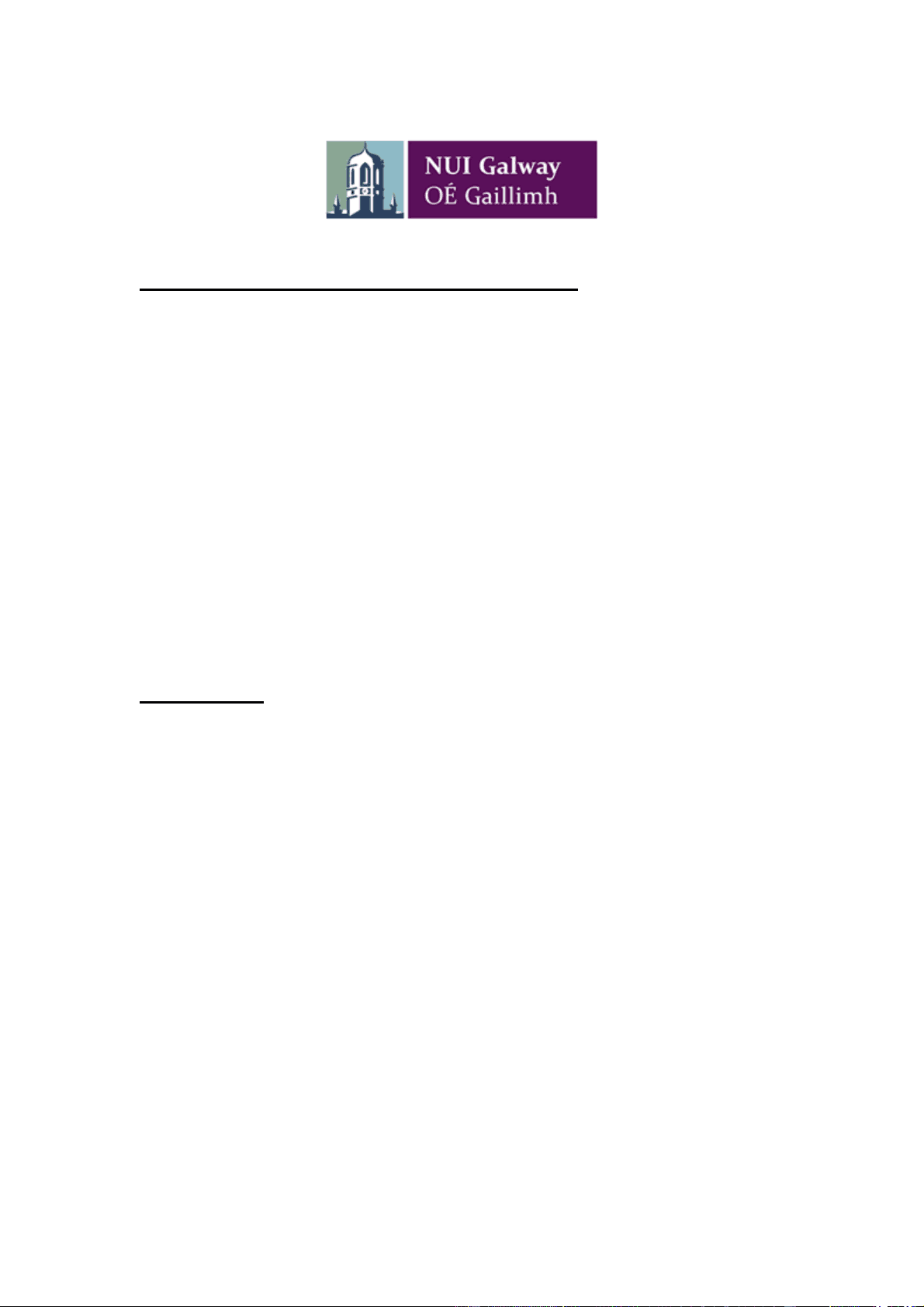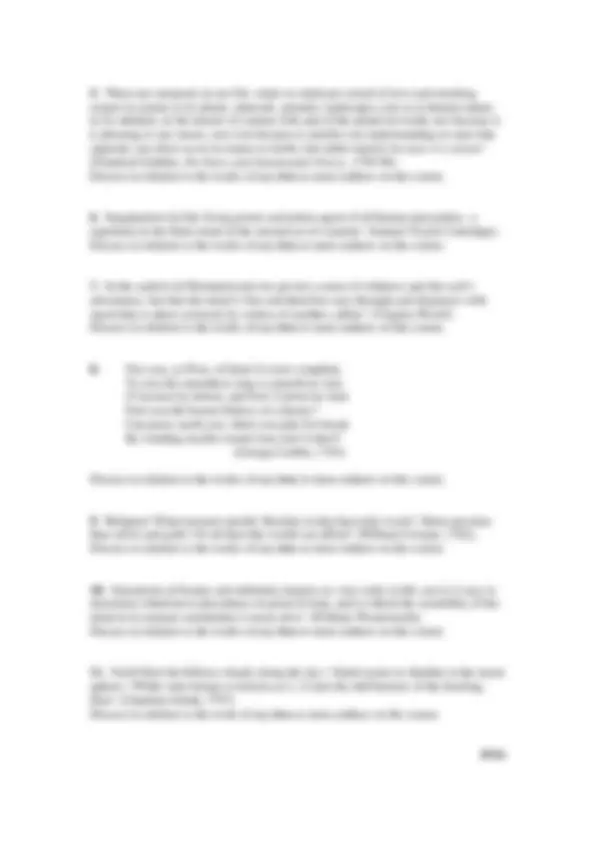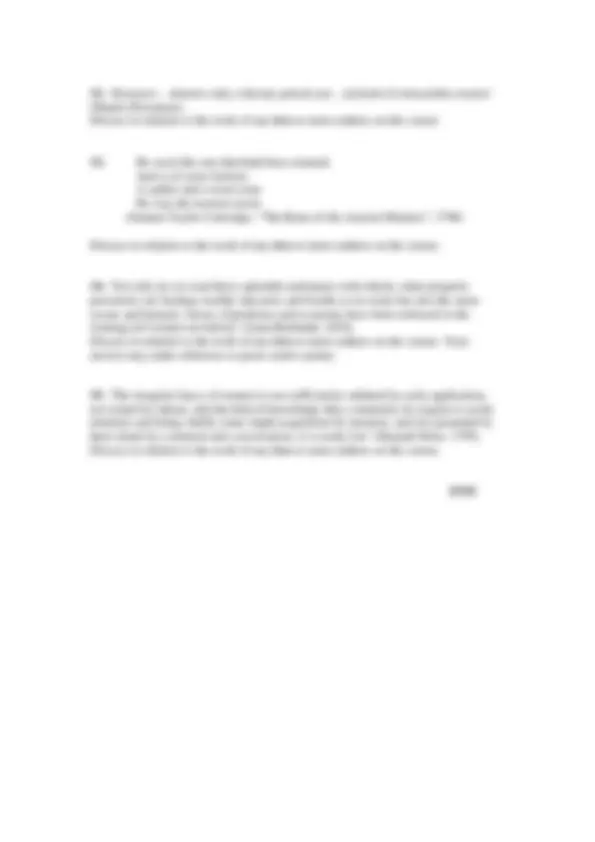




Study with the several resources on Docsity

Earn points by helping other students or get them with a premium plan


Prepare for your exams
Study with the several resources on Docsity

Earn points to download
Earn points by helping other students or get them with a premium plan
Community
Ask the community for help and clear up your study doubts
Discover the best universities in your country according to Docsity users
Free resources
Download our free guides on studying techniques, anxiety management strategies, and thesis advice from Docsity tutors
Information about the examinations for the english literature & culture: romanticism module during the academic year 2011-2012. It includes the exam codes, duration, number of pages, and requirements. The document also lists the authors and texts students must discuss, as well as the quotations they must engage with for each question.
Typology: Exams
1 / 4

This page cannot be seen from the preview
Don't miss anything!



Exam Code(s) 3BA1, 4BA4, 4BCW1, 4BFS1, 4BHR1, 4BIS1, 4BTP1, 4BWM
Exam(s) 3 rd^ Arts, 4 th^ Arts
Module Code(s) EN Module(s) Literature & Culture: Romanticism
Paper No. I
External Examiner(s) Professor S. Matterson Professor H. Phillips Internal Examiner(s) Professor S. Ryder *Professor Daniel Carey Dr Muireann O’Cinneide
No. of Pages^3 Discipline(s) English
Requirements None
Answer ANY TWO of the following questions.
You must discuss the work of at least FOUR different authors in your exam paper as a whole ( i.e. a minimum of two different authors per answer ). You may make use of an author discussed in the mid-term assignment providing you do not make substantial use of the same texts as you discussed in the mid-term.
Your exam paper must also discuss at least TWO of the following prose texts ( not necessarily in the same answer ):
Jane Austen, Sense and Sensibility Maria Edgeworth, Belinda Thomas De Quincey, Confessions of an English Opium Eater Thomas De Quincey, On Murder James Hogg, The Private Memoirs and Confessions of a Justified Sinner Thomas Love Peacock, Nightmare Abbey
****You must engage with the quotation provided in each question****
1. ‘A supernatural tale is in most cases received as an agreeable mode of amusing society, and he would be rather accounted a sturdy moralist than an entertaining companion who should employ himself in assailing its credibility’ (Sir Walter Scott). Discuss in relation to the work of any two or more authors on the course. 2. ‘I was a vile degraded slave, / In mind and body chain’d!’ (Anonymous poem, 1830). Discuss in relation to the work of any two or more authors on the course. 3. ‘For my own part, I confess that, when I take up a novel, my end and object is entertainment….But it is not necessary to rest the credit of these works on amusement alone, since it is certain they have had a very strong effect in infusing principles and moral feelings’ (Anna Barbauld, 1810). Discuss in relation to the work of any two or more authors on the course. 4. ‘I looked on the book also, and still it seemed a Bible, having columns, chapters, and verses; but it was in a language of which I was wholly ignorant, and all intersected with red lines and verses. A sensation resembling a stroke of electricity came over me, on first casting my eyes on that mysterious book, and I stood motionless’ (James Hogg, The Private Memoirs and Confessions of a Justified Sinner , 1824). Discuss the role of readers and of reading in the work of any two or more authors on the course.
12. ‘ Romantic …denotes only a literary period, not…[a] kind of extractable essence’ (Martin Priestman). Discuss in relation to the work of any two or more authors on the course. 13. He went like one that hath been stunned, And is of sense forlorn: A sadder and a wiser man. He rose the morrow morn. (Samuel Taylor Coleridge, “The Rime of the Ancient Mariner”, 1798)
Discuss in relation to the work of any two or more authors on the course.
14. ‘Not only do we read those splendid sentiments with which, when properly presented, our feelings readily take part, and kindle as we read; but also the more severe and homely virtues of prudence and economy have been enforced in the writings [of women novelists]’ (Anna Barbauld, 1810). Discuss in relation to the work of any two or more authors on the course. Your answer may make reference to prose and/or poetry. 15. ‘The irregular fancy of women is not sufficiently subdued by early application, nor tamed by labour, and the kind of knowledge they commonly do acquire is easily attained; and being chiefly some slight acquisition by memory, and not grounded in their minds by comment and conversation, it is easily lost’ (Hannah More, 1799). Discuss in relation to the work of any two or more authors on the course.